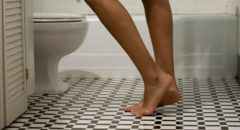
Most of us use tampons, pads, menstrual cups, or period pants when our periods arrive. But if you've heard more about free bleeding—using nothing during your period—you definitely have questions.
Free bleeding is precisely what it sounds like, but the subtleties are still unclear to those who haven't experienced it.
What Is Free Bleeding?
When you don't stop or collect your period blood, it's free bleeding. Consequently, things may grow untidy (think daily underwear or outfit changes). Period panties like Thinx and period-proof running shorts may help you adjust to free bleeding. You should go period product-free if you're going to free bleed.
Of course, free bleeding isn't new. According to Jennifer Wider, M.D., author of The Savvy Woman Patient, ancient people believed menstrual blood was mystical. Sanitary belts and tampons were created in the late 19th century, according to Wider.
Recently, drummer Kiran Gandhi raced the 2015 London Marathon despite bleeding. "I raced with blood flowing down my legs for sisters who don't have access to tampons and sisters who, despite cramps and discomfort, tuck it away and act like it doesn't exist," she said on her personal blog.
Not just Kiran. Some ladies free bleed to raise awareness of people without feminine hygiene products, while others do it to remove the stigma of period blood (and having a period at all). Some prefer not to use tampons or pads, and free bleeding is a very personal decision.
RELATED: There’s More to Periods Than Pads and Tampons
Is It Healthier To Just Let Things Flow?
According to Wider, eliminating tampons reduces the risk of toxic shock syndrome (TSS), a life-threatening condition that may occur if you leave one in too long. (Tip: Tampons should only be worn for eight hours). However, pads reduce that danger.
Free bleeding has no health advantages, although it may be more pleasant for women than using a tampon, pad, or menstrual cup. "Women who free bleed frequently describe it as freeing and believe that there is nothing they need to conceal or feel embarrassed of," explains Wider. "A personal decision."
What Does This Mean For Other Methods Of Period Wear?
Free bleeding is sometimes a protest against menstruation products. Although none of these goods are placed into the vagina, they're still menstruation products.
Here's the confusion. It's tempting to group period panties into the menstrual product category, but these newfangled things are distinct.
First, they're meant to feel natural rather than like underwear. Additionally, they resemble underpants. Because of its construction, you may also go about your day without worrying about your period.
Most contain many layers of cloth for varied purposes. One brand, Thinx, employs four layers:
- a moisture-wicking layer
- an odor-controlling layer
- an absorbent layer
- a leak-resistant layer
Period-proof items are menstruation products. Their personal independence has cemented their free-bleeding status.
What Period Bottoms Are Out There?
Due to the popularity of free bleeding, various companies have created high-quality underwear and sportswear that make daily living stress-free. Some are water-friendly.
Here are some top choices.
For Every Day
- Thinx is one of the biggest period-proof brands. Its Hiphugger panties can hold up to two tampons' worth of blood, so they're ideal for the heavier days of your cycle.
- Knix's Leakproof Boyshort is another comfy style. It has a thin built-in liner and technology that can absorb up to 3 teaspoons of blood or two tampons.
- Lunapads' Maia Bikini panties can be customized to suit your flow. Wear alone on lighter days, and add an insert when you need a little more protection.
For Yoga & Other Low- To Moderate-Impact Activity
- Modibodi, the "original" period underwear company, now makes sportswear. 3/4 leggings may absorb one to 1.5 tampons of blood. Wear them with or without underwear!
- Dear Kate's Leolux Leotard has three layers. It keeps you dry, resists leaks, and can replace 1 1/2 tampons.
- Thinx Training Shorts may be the only period-proof running shorts. They have built-in underpants and absorb as much blood as two tampons.
For Running & Other High-Impact Activity
- Ruby Love's Period Leggings provide leakproof protection for all exercises. Their lightweight lining lets you wear them alone or with underwear if your flow is heavy.
For Swimming
- Modibodi's One Piece is a period-proof swimwear. Heavy days may need extra protection.
- Ruby Love Period Swimwear has bikinis. Built-in liner and leakproof technology provide all-day protection. Combine this bikini bottom with any top.
How Can Someone Move Into Free Bleeding?
Here are some pointers if you'd like to try free bleeding:
- Decide wisely. Bleed on what? When do you want it? Where? When you know everything, you can attempt it.
- Start safe. That's usually home, but it may be somewhere you're comfortable. This will teach you about your period and flow.
- Sit on towels. Put a towel on your bed at night. Some people exclusively free bleed at home on towels to avoid staining furnishings. Start with this method.
- If you're comfy, go outdoors. Only do this towards the conclusion of your period when blood flow is lowest. You may also bleed in public the whole time. You decide.
- Bring extra underwear. If you leave home and your period soaks through your clothes, take extra underwear and a change.
Some ancient cultures thought period blood was magical, but over time, the belief that periods are disgusting and should be concealed spread. Some societies still reject menstruating women. In Nepal, menstruation women were exiled to huts.
The "tampon tax" has been a major obstacle to normalizing this physiological function in Western nations. The stigma lingers even after the practice was criminalized in 2017. Some have circumvented the legislation.
Many factors lure people to free bleeding. Some of these include the fact that individuals prefer their natural condition or are straightforward. Anything challenging decades of social norms, whether free bleeding or anything else, will raise controversy.
However, many are more sophisticated. Free bleeders try to normalize menstruation by not hiding their periods. The "tampon tax" may be another issue. Traditional menstruation products are sometimes priced as luxury commodities.
Others may free-bleed to raise awareness of period poverty, lack of goods, and menstruation education. Also, the environment. Waste from disposable menstruation products is substantial.
20 billion pads and tampons end up in North American landfills annually. Period underwear, menstrual cups, and free bleeding lower this figure.








